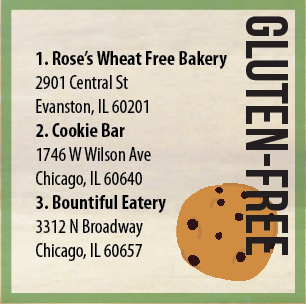
There’s a new star on stage…and it won’t be winning an Oscar.
Over the past couple of years, a spotlight has been directed onto gluten, a substance composed of the proteins gliadin and glutenin.
According to nutrition specialist Bonnie Minsky, a recent study was conducted by Celiac Disease researchers that found 1 of 100 people living in the United States have Celiac Disease.
Gastroenterologist Andrew Albert defines Celiac Disease as an allergy to gluten, an entity found in wheat, barley and rye. Gluten intolerance, however, is purely a sensitivity to gluten that may cause symptoms such as bloating, constipation and gastrointestinal pains, Albert said.
“Americans were brainwashed to believe that whole wheat ‘everything’ was good for them.” said Minsky. “We even added extra gluten to our whole wheat so that our whole wheat products would taste better. …It stands to reason that our excess consumption of gluten must take much of the blame [for the high rate of gluten intolerance.]”
Junior Sam Klein has eaten a gluten-free diet for nearly his entire life. Klein said that after experiencing extreme eczema as a child, his mother, who is a nutritionist, removed gluten from his diet.
Unlike Klein, who avoids gluten due to his intolerance, senior Emily Westel said she recently became “gluten-free” in order to live a healthier lifestyle.
“My sister and I wanted to try it,” said Westel. “…It’s healthier than eating a lot of gluten and I think…the biggest thing why that is, is because gluten is in so many things that are just not good for you. It [is] not even that gluten in itself is bad for you, but it cuts out a lot of junk food.”
Nutrition specialist Stephanie Coogan agrees that gluten itself is not bad for you. However, Coogan said she does not recommend cutting out gluten when one does not have Celiac disease or a sensitivity to it.
“The whole grains really are important to us because they give us fiber and vitamins and minerals that we need to be healthy.”
Contrary to Coogan’s beliefs, Minsky said she believes that most people will stay healthier by minimizing gluten and replacing it with gluten-free grains and grain-like foods such as brown rice, wild rice, buckwheat and quinoa.
Albert said he wants people to know that there are multiple gluten-free options available today and one should not feel overwhelmed if they are diagnosed with Celiac Disease or a gluten intolerance.
According to Coogan, people can lead healthy lifestyles by consuming a moderate amount of whole grains, plenty of fruits and vegetables, proteins and monitoring the total amount of calories being eaten rather than excluding an entire food group.
“[Eating gluten-free] really makes you look at what actually is in what you [are] eating,” said Westel. “It makes you look at what else are you putting into your body and [whether or not] you really want to be doing that.”

